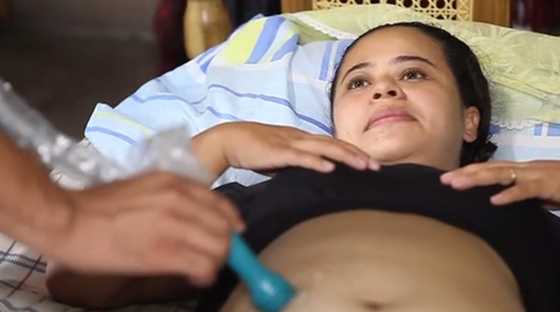USAID sponsored a course for more than 40 delegates from the Ministries of Health and Finance from the Dominican Republic, Guatemala, Guyana, Haiti, Honduras, El Salvador, and Peru to learn about strengthening health systems and implementing Universal Health Coverage in March 2015.

Marina Delgado (photo), 31, is expecting her second child. She lives in the rural area of Cerro Colorado, El Salvador. Thanks to the Health Reform implemented by the Government, Marina is receiving the appropriate health care during her pregnancy.
Within the framework of the event, we took the opportunity to talk to representatives of some of these countries to learn about their experiences in reducing health inequities, which is the objective of the movement A Renewed Promise for the Americas, of which PAHO/WHO is a member.
In an interview with delegates from the Ministry of Health of El Salvador, we learned about some of the advances that have been made in reducing maternal mortality.
Challenges in reaching the rural areas before the reform
In 2009, the Ministry of Health of El Salvador initiated the Health Reform. Before the Reform, major inequities were identified: primary care coverage was limited only to some municipalities —often leaving remote rural areas aside - reaching only 40% of the population of the 80 % that corresponded to the Ministry of Health. Furthermore, it was found that a so-called "voluntary fee" was being charged, which required patients to pay a dollar per visit.
The health system before 2009 was fragmented, segmented and offered poor quality health care. In addition, the surgical equipment was obsolete and there were shortages of drugs and limitations in human resources. Out of 30 hospitals in the country, only 3 had a maternity ward. The maternal mortality rate in 2006 was 65.4 deaths per 100,000 live births, and the under-five mortality rate was 10.2 per 1,000 live births.
Prioritizing remote municipalities
In terms of strengthening maternal and childcare, the Health Reform has had several lines of action: creating maternity wards in 25 hospitals with adequate supplies and human resources; recruitment of specialists, including pediatricians and gynecologists; strengthening obstetric and neonatal care; creating 21 maternal waiting homes; implementing 331 community health units and 38 specialized health units; and the complete elimination of fees. All these initiatives have been prioritized in remote municipalities.
The results of the Reform for maternal and child health, following the actions implemented and the investment, have resulted in an increase of institutional deliveries from 39.3 % in 2006 to 99.8% in 2013, helping to reduce maternal mortality from 65.4 in 2006 to 38 per 100,000 live births in 2013, reaching the fulfillment of MDG 5.
 "Although progress is considerable, there are challenges and we look forward to strengthening the Health Reform in our country," said Dr. Altagracia Xochitl, Medical Assistant to the Deputy Minister of Health Services, Ministry of Health of El Salvador, in an interview during the USAID and Health Finance & Governance flagship course.
"Although progress is considerable, there are challenges and we look forward to strengthening the Health Reform in our country," said Dr. Altagracia Xochitl, Medical Assistant to the Deputy Minister of Health Services, Ministry of Health of El Salvador, in an interview during the USAID and Health Finance & Governance flagship course.
El Salvador and A Promise Renewed for the Americas
El Salvador was one of the countries that signed the Declaration of Panama on September 2013, committing to reduce inequities in maternal, infant and child health. Following the signing of the Declaration by 27 Latin American and Caribbean countries, the movement A Renewed Promise for the Americas was created as a support mechanism to help countries settled to reduce inequities in health.
This Central American country through the Health Reform and the results it obtained are taking steps forward to reduce the inequality gap and provide more equitable access to remote and vulnerable populations.
About A Promise Renewed for the Americas
A Promise Renewed for the Americas (APR-LAC) is a movement that seeks to reduce the profound inequities in reproductive, maternal, neonatal, child, and adolescent health that persist in Latin American and the Caribbean.
APR-LAC collaborates with key regional stakeholders, including governments, international development agencies, civil society representatives, academic institutions, private sector, professional institutions, and non-governmental organizations to catalyze and support country-led efforts to decrease gaps in access to quality health care. As a regional movement, APR-LAC works in coordination with the global A Promise Renewed initiative.
The movement is convened by the Inter-American Development Bank (IDB), the Pan American Health Organization/World Health Organization (PAHO/WHO), the United Nations Children's Fund (UNICEF), the United States Agency for International Development (USAID) and the World Bank.
By Diana Valcárcel for A Promise Renewed for the Americas



